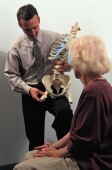Older Adults Reluctant to Question Surgical Treatment
They only raised about half their concerns, so doctors should listen carefully, study says.
|
E-mail this article
Subscribe to news
Printer friendly version
|

(SOURCE: Indiana University, news release, July 31, 2008)
FRIDAY, Aug. 15 (HealthDay News) -- Older patients and surgeons don't communicate effectively when discussing surgical treatment options, even though the decision to have surgery can be particularly difficult and confusing for seniors, says an Indiana University School of Medicine study.
The researchers recorded patient-surgeon consultations and later interviewed the patients about their concerns and whether they discussed those worries with the surgeon. The study found that older patients raised only about half of their concerns when talking with the surgeon.
"Unexpressed concerns are challenging, because they can lead to different expectations and understanding of the problems patients are concerned about and treatment recommendations that are poorly tailored to patient needs," study author Richard M. Frankel, a professor of medicine, said in a university news release.
If concerns aren't expressed, "physicians will have little chance to correct or modify them. Unfortunately, unexpressed concerns may contribute to breakdowns in communication which are frustrating for both physicians and patients," he added.
Most (84 percent) of the concerns expressed by older adults in the study were related to the surgery itself. Other major concerns included: quality of life after surgery; the post-surgery care facility; and the timing of the surgery.
Only 16 percent of concerns were related to the surgeons, including doubts about competency and the perception that surgeons tend to promote surgery as the only real treatment option.
While surgeons generally respond well to concerns raised by patients, the study found that patients may be highly selective about which concerns they mention.
"Knowing that older adults frequently don't voice all their concerns should help surgeons create opportunities for patients who are reluctant to bring them up," Frankel said.
The study was published in the July issue of The Journal of Bone and Joint Surgery.
More information
The U.S. National Institute on Aging has more about seniors and surgery.
Copyright © 2008 ScoutNews, LLC. All rights reserved. 
HealthDayNews articles are derived from various sources and do not reflect federal policy. healthfinder.gov does not endorse opinions, products, or services that may appear in news stories. For more information on health topics in the news, visit the healthfinder.gov health library.